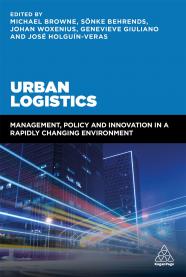Approximately 80 percent of European and American citizens live in an urban environment. Due to their large populations and extensive commercial establishments, urban areas require large quantities of goods and services for commercial and domestic use.
This results in increased levels of demand for urban freight transport services. Freight transport in towns and cities is a major contributor to environmental impacts, particularly to local air pollution and noise. Urban Logistics addresses public policymakers, freight transport companies and receivers of supplies, providing them with the information and guidance to affect change in the logistics of the city.
Urban Logistics is written by a team of international editors combining their expertise and using their research from leading business schools in Sweden and the US. There are also valuable contributions from academics and industry experts from companies and universities from all over the world. The book includes clear examples of initiatives that work and business case developments, as well as toolkits for policymakers and managers who are devising new initiatives.
There is an in-depth examination of different aspects of urban logistics, such as retail logistics for cities, urban food supply chains, services, and the special logistics requirements involved, construction, waste management, and e-commerce and home delivery. There is also a focus on networks and partnerships and an analysis of innovation as a new constant. Online supporting resources include PowerPoint lecture slides.
Urban Logistics – Management, Policy and Innovation in a Rapidly Changing Environment
Michael Browne, Sönke Behrends, José Holguin-Veras, Genevieve Giuliano, Johan Woxenius
From £44.99

